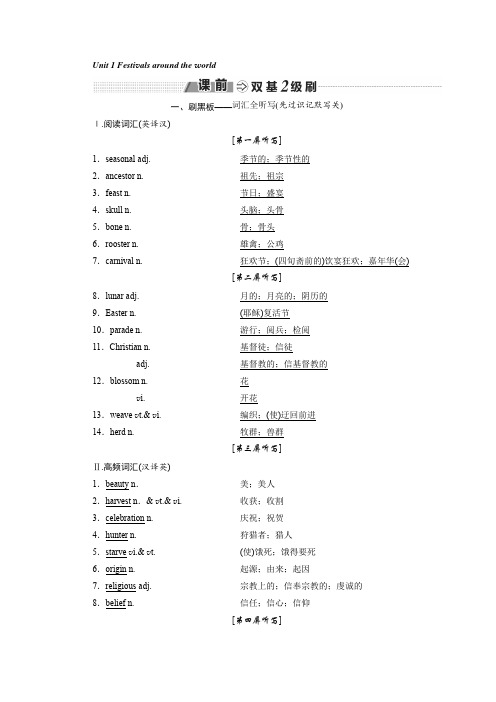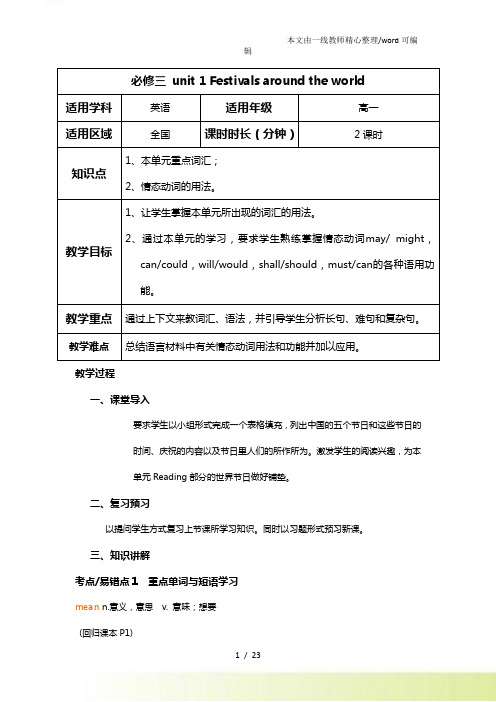【2018——2019学年人教版高一英语】必修三 unit 1 _教案-最新学习文档
2018-2019学年高中新创新一轮复习英语讲义:必修三 Unit 1 Festivals around the world 含答案

Unit 1 Festi v als around the w orld一、刷黑板——词汇全听写(先过识记默写关)Ⅰ.阅读词汇(英译汉)[第一屏听写]1.seasonal adj.季节的;季节性的2.ancestor n. 祖先;祖宗3.feast n. 节日;盛宴4.skull n. 头脑;头骨5.bone n. 骨;骨头6.rooster n. 雄禽;公鸡7.carnival n. 狂欢节;(四旬斋前的)饮宴狂欢;嘉年华(会)[第二屏听写]8.lunar adj.月的;月亮的;阴历的9.Easter n. (耶稣)复活节10.parade n. 游行;阅兵;检阅11.Christian n. 基督徒;信徒adj.基督教的;信基督教的12.blossom n. 花v i.开花13.weave v t.& v i.编织;(使)迂回前进14.herd n. 牧群;兽群[第三屏听写]Ⅱ.高频词汇(汉译英)1.beauty n.美;美人2.harvest n.& v t.& v i.收获;收割3.celebration n. 庆祝;祝贺4.hunter n. 狩猎者;猎人5.starve v i.& v t.(使)饿死;饿得要死6.origin n. 起源;由来;起因7.religious adj.宗教上的;信奉宗教的;虔诚的8.belief n. 信任;信心;信仰[第四屏听写]9.trick n.诡计;恶作剧;窍门v t.欺骗;诈骗10.poet n. 诗人11.arrival n. 到来;到达;到达者12.gain v t.获得;得到13.independence n. 独立;自主14.independent adj.独立的;自主的15.gather v t.& v i.搜集;集合;聚集16.agriculture n. 农业;农艺;农学[第五屏听写]17.agricultural adj.农业的;农艺的18.award n. 奖;奖品v t.授予;判定19.admire v t.赞美;钦佩;羡慕20.energetic adj.充满活力的;精力充沛的;积极的21.clothing n. 衣服22.custom n. 习惯;风俗23.worldwide adj.遍及全世界的;世界性的[第五屏听写]24.fool n.愚人;白痴;受骗者v t.愚弄;欺骗v i.干傻事;开玩笑adj.傻的25.permission n. 许可;允许26.parking n. (汽车等)停放27.apologize v i.道歉;辩白28.drown v t.&v i.淹没;溺死;淹死29.sadness n. 悲哀;悲伤[第七屏听写]30.obvious adj.明显的;显而易见的31.wipe v t.擦;揩;擦去32.weep v i.哭泣;流泪n. 哭;哭泣33.remind v t.提醒;使想起34.forgive v t.原谅;饶恕35.take_place 发生36.in_memory_of 纪念;追念37.dress_up 穿上盛装;打扮;装饰38.play_a_trick_on 搞恶作剧;诈骗;开玩笑[第八屏听写]39.look_forward_to期望;期待;盼望40.day_and_night 日夜;昼夜;整天41.as_though 好像42.have_fun_with 玩得开心43.parking_lot 停车场44.turn_up 出现;到场45.keep_one's_word 守信用;履行诺言46.hold_one's_breath 屏息;屏气47.set_off 出发;动身;使爆炸48.remind_..._of_... 使……想起……二、刷清单——热身自盘点(再过基本应用关) (一)核心单词(三)经典句式(四)初中考点再回顾一、过重点单词——纵引横联超人一点1.trick n.诡计;恶作剧;窍门v t.欺骗;诈骗[教材原句] If the neighbours do not give any sweets, the children might play a trick on them.如果邻居们什么糖也不给,那么孩子们就可以捉弄他们了。
高一英语必修三的教案

高一英语必修三的教案教学目标1.通过本单元学习,学生将能够掌握必要的词汇,包括与环境保护相关的词汇,比如“pollution,”“emission,” 和“conservation.”2.学生将学会采用英语进行环保主题的讨论,并学会提出自己的看法和想法。
3.学生将能够理解环保主题的新闻报道,并能胜任完成阅读理解测试的挑战。
讲课步骤前言在教学本单元之前,老师应先了解学生在环保方面的观念和知识积累,并在课程中重点关注环保相关的话题,如环境保护组织,能源和环境污染等内容。
第一步:词汇学习1.环保相关的单词和词组以及其含义–pollution: 污染–emission: 排放–conservation: 保护–sustnable: 可持续的–renewable: 可再生的2.常见句型–It is important/necessary to protect the environment.——保护环境很重要/必要。
–We should do our best to reducepollution.——我们应该尽力减少污染。
–Renewable energy should be developed widely.——可再生能源应该广泛发展。
第二步:听力训练教师播放关于“环保”的录音,要求学生听清答案,了解短文风格并掌握新单词。
播放结束后,老师可以进行问答,了解学生对于短文的内容、理解程度以及是否遇到难点。
第三步:课文理解1.教师进行课文阅读和解析,了解文章主题,情绪和短文主要分成部分。
2.对于生字或专业词汇,教师进行相关解释,帮助学生理解短文内容。
3.教师可以进行放映相关短片或介绍有关环保组织的PPT,帮助学生理解短文。
第四步:阅读理解教师出示阅读理解测试卷,学生阅读完毕后进行答题,老师可以进行现场解析并详细评分,让学生理解并知道自己的不足之处。
课后作业1.让学生回顾教学内容并总结重要知识点,形成笔记并逐一加以理解,夯实基础。
【人教高一英语】必修三 unit 1 教案

必修三unit 1 Festivals around the world 适用学科英语适用年级高一适用区域全国课时时长(分钟)2课时知识点1、本单元重点词汇;2、情态动词的用法。
教学目标1、让学生掌握本单元所出现的词汇的用法。
2、通过本单元的学习,要求学生熟练掌握情态动词may/ might,can/could,will/would,shall/should,must/can的各种语用功能。
教学重点通过上下文来教词汇、语法,并引导学生分析长句、难句和复杂句。
教学难点总结语言材料中有关情态动词用法和功能并加以应用。
教学过程一、课堂导入要求学生以小组形式完成一个表格填充,列出中国的五个节日和这些节日的时间、庆祝的内容以及节日里人们的所作所为。
激发学生的阅读兴趣,为本单元Reading部分的世界节日做好铺垫。
二、复习预习以提问学生方式复习上节课所学习知识。
同时以习题形式预习新课。
三、知识讲解考点/易错点1 重点单词与短语学习mean n.意义,意思v. 意味;想要(回归课本P1)Festivals are meant to celebrate important times of year.[归纳拓展]mean to do 打算做某事be meant to do 被要求做…mean doing 意味着….eg. I never meant him to work for us.Passing the entrance examination means being admitted into college.take place发生(回归课本P1)Discuss when they take place, what they celebrate and what people do at that time. [归纳拓展] take place/happen/occur/break out/come about(1)take place 其“发生”是按意图或计划进行,无偶然性,无被动语态。
高一英语(人教版)-必修三 Unit 1 Festivals And Celebrations

Read and find out
1. Why do people celebrate the harvest festivals?
…People celebrate to show that they are grateful for the year’s supply of food.(Para. 2)
Read and find out
Read after the tape and underline the topic sentence of each paragraph that gives the main idea.
Para 3: Customs play a significant role in festivals but sometimes they can change over time.
Why do we celebrate festivals?
harvest festivals (Para. 2) customs and traditions (Para. 3) commercialisation (Para. 4) other reasons (Para. 5)
Identify the main idea of a paragraph
Read and find out
Read after the tape and underline the topic sentence of each paragraph that gives the main idea.
Para 2: Of all the traditional festivals, the harvest festival can be found in almost every culture.
高一英语(人教版)-必修三-Unit-1-Festivals-and-Celebrations

5. What was the best part of the festival?
Activity 1
• Song Lin and Max are talking about a recent festival experience. Listen to their conversation and answer the questions. (P7 Ex.1)
• Song Lin and Max are talking about a recent festival experience.
What topics might be covered in the conversation?
✓ Activities; ✓ Food; ✓ Feelings; ✓…
2. What did Max do during the festival? activities
Listen and check
• Listen to this part and find out the answer to the question.
Song Lin: Good for you! So what did you do when you arrived home? Max: Well, first I helped decorate the Christmas tree and put presents under it. Then I helped my mum prepare for the family dinner on Christmas Eve.
Review
• Why are festivals important in our life?
Festivals … ✓ are occasions that allow us to relax and enjoy life, and forget about
Unit1Festivalsaroundtheworld(新课标版高一英语必修三教案教学设计)

Unit 1 Festivals around the world(新课标版高一英语必修三教案教学设计)Unit 1 Festivals around the worldThe First Period (Warming up & Pre-reading)Step One: Lead-inFree Talk: Did you have a good time in your winter holidays?When did you feel most happy and excited? Why?( At the Spring Festival. Because it's the most important festival in our country....)Step Two: Warming up1. Let the Ss think about the other Chinese festivals.( Lantern Festival, Pure Brightness Festival, Dragon Boat Festival, Mid-Autumn Festival, New Year's Day, Chung Yeung Festival....)2. Discussion One1)Let the Ss look at the information about Chinese festivals and discuss another four Chinese festivals according to the example in warming up: When does the festival come?What do people celebrate?What do people do?Festivals Date festivals DateNew Year January1st Teachers' Day September 10thInternational Women's Day March 8 National Day October 1stArbor Day March 12th The Spring Festival Lunar New Year International labor Day May 1st Dragon Boat Festival the fifth day of the fifth lunar monthInternational Children's Day June 1st Mid-Autumn Festivalthe 15th day of the 8th lunar monthArmy Day August 1st Lantern Festival the 15th day of the 1st lunar monthChinese Youth Day May 4th Pure Brightness Day April the fifth2) Let the Ss fill in the form in the warming up and ask some to share their opinions with the whole class.3 Discussion TwoTalk about some foreign festivals.( Christmas, April Fools Day, Easter Day, Halloween, Valentine's Day, Thanksgiving Day, Obon...)Step three: Pre-readingLet students think about the questions:1) What is your favourate holiday of the year? Why?2)What festivals or celebrations do you enjoy in your city or town? Do you like spending festivals with your family or with friends? What part of a festival do you like best- the music, the things to see, the visits or the food?Step Four: Language Points1.mean to do 打算做某事mean doing 意味着….I never meant him to work for us.Passing the entrance examination means being admitted into college.2. celebrate vt.(1) do sth to show that a day or an event is important 庆祝;祝贺celebrate Christmas / one’s birthday / a wedding anniversary / a victory(2) praise and honor 赞扬;称颂The names of many heroes are celebrated by the poets.词语辨析:celebrate, congratulatecelebrate后常接日期、事情或场合。
高中英语必修三unit1教案
高中英语必修三unit1教案教学目标1. 让学生掌握本单元的核心词汇和表达方式。
2. 培养学生通过语境理解词义和句意的能力。
3. 提高学生的听说读写综合运用能力,尤其是口语交际能力。
4. 引导学生了解和认识中西方文化差异,培养跨文化交际意识。
教学重点与难点- 重点:核心词汇的正确使用,以及日常交流中的常见表达。
- 难点:理解和运用抽象词汇进行实际交流。
教学准备- 教材内容熟悉:确保对课本内容有深入的理解。
- 多媒体课件:准备相关的图片、音频和视频材料以辅助教学。
- 互动活动设计:制定小组讨论、角色扮演等互动环节的计划。
教学过程导入阶段(Warming u)- 通过展示与主题相关的图片或视频,激发学生的兴趣。
- 提问学生关于主题的前置知识,为新课内容做铺垫。
呈现阶段(resentation)- 利用T呈现新单词和短语,结合例句讲解其用法。
- 教师领读单词和短语,注意发音和语调。
- 播放课文录音,让学生跟读,注意模仿语音语调。
练习阶段(ractice)- 分组练习对话,鼓励学生运用新学的表达进行交流。
- 完成课本上的练习题,巩固新知识点。
- 通过角色扮演等活动,让学生在情境中使用英语。
应用阶段(Alication)- 小组讨论相关话题,如文化交流的重要性等。
- 模拟真实场景,如在机场、酒店等情境下的交际对话。
总结与反馈(Summary and feedack)- 总结本节课学习的核心内容。
- 提供反馈,指出学生在学习过程中的优点和需要改进的地方。
作业布置- 背诵本单元的核心词汇和短语。
- 完成一篇关于文化差异的小短文,运用所学知识。
教学反思- 分析本节课的教学效果,记录学生的学习情况。
- 思考如何改进教学方法,提高学生的学习效率。
高一英语人教新课标必修三 Unit1 workbook课件(共28张)
Although feeling tired, I was extremely delighted because the Spring Festival provides an invaluable chance for us to enjoy ourselves with friends and relatives as well as be proud of our customs. I’m looking forward to the coming of the next festival.
On the Eve of the festival, my family members absolutely enjoyed getting together to have a big meal, including the tasty dumplings, fish and so on as we watched the Spring Gala, which was really a feast for the eyes. Additionally, my parents gave me some lucky money in
joy/joyful faith/faithful use/useful help/helpful harm/harmful forget/forgetful care/careful pain/painful wonder/wonderful color/colorful thank/thankful ……
2018-2019学年高一英语人教版必修三重点点拨学案Unit1PeriodTwoWord版含答案
Period Two Warming Up & Reading—Language Points一、词汇过关基础词汇1.harvest n.& v.收获;收割2.ancestor n.祖先;祖宗3.feast n.节日;盛宴4.bone n.骨;骨头5.trick n.诡计;恶作剧;窍门;v t.欺骗;诈骗6.poet n.诗人7.gain v t.获得;得到8.gather v t.& v i.搜集;集合;聚集9.award n.奖;奖品;v t.授予;判定10.custom n.习惯;风俗拓展词汇1.beauty n.美;美人→beautiful adj.美丽的2.celebration n.祝贺;庆贺→celebrate v.庆祝3.starve v i.& v t.(使)饿死;饿得要死→starvation n.挨饿;饿死4.origin n.起源;由来;起因→original adj.最初的;原始的5.religious adj.宗教上的;信奉宗教的;虔诚的→religion n.宗教6.belief n.信任;信心;信仰→believe v.相信;认为7.arrival n.到来;到达;到达者→arrive v i.到达8.independence n.独立;自主→independent adj.独立的;自主的9.agriculture n.农业;农艺;农学→agricultural adj.农业的;农艺的10.energetic adj.充满活力的;精力充沛的;积极的→energy n.精力;能量联想归纳1.构词法[规则]in-(否定前缀)+dependent(依赖的)→independent独立的;自主的[联想](1)informal非正式的(2)incomplete不完整的(3)invisible看不见的(4)inconvenient不方便的2.话题词汇——与节假日活动有关的词汇(1)festival n.节日(2)celebration n.庆祝(3)in memory of纪念;追念(4)feast n.节日;盛宴(5)dress up穿上盛装;打扮(6)parade n.游行;阅兵;检阅(7)Jesus耶稣二、短语互译汉译英1.take place发生;举行2.in memory of 纪念;追念3.dress up 穿上盛装;打扮;装饰4.play a trick on 搞恶作剧;诈骗;开玩笑5.look forward to 期望;期待;盼望6.day and night 日夜;昼夜;整天7.have fun with 玩得开心英译汉1.do harm (to sb.)(给某人)带来危害2.in the shape of skulls 呈颅骨的形状3.gain India’s independence 赢得印度的独立4.decorate...with... 用……装饰……5.get together 聚会;聚集6.lucky money in red paper 红纸包着的压岁钱7.be proud of 为……而自豪三、重点句式教材原句1.At that time people would starve if food was difficult to find,especially during the cold winter months.在那个时候,尤其是在寒冷的冬季,如果难以找到食物,人们就会挨饿。
高一语(人教版)-必修三Unit 1 Festivals And Celebrations-教案
Why do people celebrate the harvest festivals?
What role do customs and traditions play in festivals?
Why did the writer mention the commercialisation offestivals?
学生通过制作思维导图,更好的理解文章的结构特点。
Post-reading
学生结合课文内容和自身生活实际,思考问题,谈论对节日传统文化和节日形式改变的看法。
What do most festivals seem to have in common?
How do you feel about festival customs that have already faded away?
教师针对本课主题提问。
What festivals do you celebrate with your family each year?
Why do you think people celebrate different festivals?
学生根据教师提出的问题认真思考,并回答问题。
学生阅读文章标题“Why do we celebrate festivals?”并思考更多人们庆祝节日的原因。教师列出四个原因,引发学生思考并引入本单元重点词汇。
引导学生通过观察图片中呈现的情境、物品和文字介绍节日,并引入本课生词,为阅读课文做好准备。
While-reading
1.学生第一遍阅读课文,梳理文章大意,并回答问题。
Why do we celebrate festivals?
- 1、下载文档前请自行甄别文档内容的完整性,平台不提供额外的编辑、内容补充、找答案等附加服务。
- 2、"仅部分预览"的文档,不可在线预览部分如存在完整性等问题,可反馈申请退款(可完整预览的文档不适用该条件!)。
- 3、如文档侵犯您的权益,请联系客服反馈,我们会尽快为您处理(人工客服工作时间:9:00-18:30)。
教学过程一、课堂导入要求学生以小组形式完成一个表格填充,列出中国的五个节日和这些节日的时间、庆祝的内容以及节日里人们的所作所为。
激发学生的阅读兴趣,为本单元Reading部分的世界节日做好铺垫。
二、复习预习以提问学生方式复习上节课所学习知识。
同时以习题形式预习新课。
三、知识讲解考点/易错点1 重点单词与短语学习mean n.意义,意思v. 意味;想要(回归课本P1)Festivals are meant to celebrate important times of year.[归纳拓展]mean to do 打算做某事be meant to do 被要求做…mean doing 意味着….eg. I never meant him to work for us.Passing the entrance examination means being admitted into college.take place发生(回归课本P1)Discuss when they take place, what they celebrate and what people do at that time. [归纳拓展] take place/happen/occur/break out/come about(1)take place 其“发生”是按意图或计划进行,无偶然性,无被动语态。
(2)happen “发生”,常指具体客观事物或情况的发生,含有“偶然”的意味。
当以具体事物、事件作主语时,happen 和occur 可以换用;但当happen用作“碰巧”之意时,不能用occur代替,但可以与come about 互换。
用法是happen to do sth.,无被动语态。
(3)occur发生,出现, 较正式用语,可指事情偶然地、意外地发生或思想突然浮在心头。
occur to 有“想起”的意思。
指具体事物时可与happen互换(但happen to do不可换成occur to do);另外occur 有“突然想起”的意思,此时不可与happen 互换,如A good idea occurred to him.(4)break out (战争、火灾等)爆发;(疾病)突然发生。
无被动语态。
(5)come about “发生,产生”,常指偶然发生的事情。
指要解释或说明事情发生的理由,且很多时候与how 连用。
In 1919, the May 4th Movement took place in China. 1919年,中国爆发了五四运动。
It happened to rain that day. 那天恰好下雨。
The traffic accident occurred on Wednesday.How does it come about that you were caught by the police? 你怎么会被警察抓去的?dress up打扮(回归课本P2)It is now a children’s festival, when they can dress up and go to their neighbors’homes to ask for sweets.[归纳拓展]dress up 盛装;打扮;装饰dress sb./oneself 给……穿衣服;打扮be/get dressed in+(衣服或表颜色的词) 穿着……dress+adv.(或表目的、场合的介词短语) 穿着……区别:dress/wear/put on/have on(1)dress是动作动词,表示“给(人)穿衣/打扮”,后面的宾语是表示人的名词。
常见的用法有dress sb./oneself, be dressed(in), dress well/quickly等。
(2)wear是状态动词,表示“穿戴、佩戴(手表、首饰、花等),留(发型、胡须)等”;还可表示“面露、面带(某种表情、样子等)”,意义广泛。
(3)put on是动作动词,表示“穿(衣)戴(帽)”,后面的宾语是表示衣服等的名词。
(4)have on是状态动词短语,除了表示“穿着,戴着”之外,还可表示树木等“披着,挂着”,不用进行时态。
gain n. 增加;利润;收获vt. 获得;增加;赚到vi. 增加;获利(回归课本P2)India has a national festival on October 2 to honor Mohandsa Candhi, the leader who helped gain India`s independence from Britain.[归纳拓展] gain/acquire/earn/achieve(1)gain 收获;获得。
指获得有用或必需的东西。
可以用于体重、力量的增加,奖学金的获得,更常用于经验、知识、教育、满足等的获得。
(2)acquire 购得,得到(尤指昂贵的或难以得到的东西);获得,掌握(知识、技能等)。
(3)earn 取得;赚得。
通常指通过工作挣钱,也可以用于应该得到的东西,如支持、认同、声望或尊敬。
(4)achieve 得到,获得。
多指成就、目标、幸福的取得。
award vt. 颁奖,授奖,给予n.奖,奖品,奖状(回归课本P2)Some people might win awards for their farm produce,like the biggest watermelon or the most handsome rooster.有些人还可能因为他们的农产品(参加各种评选)而获奖,比如最大的西瓜或最帅的公鸡。
[归纳拓展]award sb. sth./sth. to sb. 授予某人某物be awarded for... 因……而受奖win/receive/get an award for 因……而获奖①He was awarded a medal for bravery.②The Olympic winner received a gold medal as an award.③ How can I reward your help? =How can I reward you for your help?区别: award, reward, prize, medalaward: 指因成绩或贡献由政府或组织颁发的“奖”获“奖金”。
reward: 意为回报,报酬,报应,酬劳。
prize: 奖品,奖金,战利品,捕获物。
medal: 奖章,勋章,纪念章,如金牌,银牌。
admire vt. 赞美;钦佩;羡慕(回归课本P2)China and Japan have M idAutumn festivals,when people admire the moon and in China,enjoy moon cakes.中国和日本都有中秋节,这时,人们会赏月。
在中国,人们还品尝月饼。
[归纳拓展]admiration n. 赞美,钦佩admirable adj. 可饮佩的,极佳的admiring adj. 赞赏的,羡慕的admire sb. for sth. 因某事而钦佩某人have admiration for sb./ sth. 羡慕/钦佩某人/物watch/gaze in admiration 赞赏地观看/凝视着①The school is widely admired for its excellent teaching. (be admired for)这所学校教学优秀,远近称誉。
②You have to admire the way he handled the situation.你不得不佩服他处理这个局面的手段。
③I am filled with admiration for his courage. =I have admiration for his courage. 我对他的勇气十分钦佩。
in memory of纪念;追念(回归课本P2)For the Japanese festival Obon,people should go to clean graves and light incense in memory of their ancestors. 在日本的盂兰盆节,人们要上坟扫墓、烧香,以缅怀祖先。
①A film will be made in memory of those brave firefi ghters.为了纪念那些勇敢的消防战士,一部电影即将开拍。
②She has an excellent memory for names,which helps her quite a lot in her work. 她对名字有极佳的记忆力,这对她的工作很有帮助。
③The life in the countryside has become a distant memory.那段乡村生活已成为遥远的记忆。
[归纳拓展] in+n.+of 短语in praise of 歌颂in honor of 纪念;为向……表示敬意in favor of 赞同in support of 支持in charge of 负责in search of 寻找in possession of 拥有in need/want of需要in place of 代替in hope of 希望set off出发;动身;使爆炸;引起(回归课本P7)At 10 o’clock we set off for our homeland. Two hours later we arrived at the city located on the coast. On the street decorated with festival gifts and all kinds of flowers some children were setting off fireworks. The Spring Festival set off a wave of sales in every shop. People everywhere were cheering up.[归纳拓展]set off 出发;动身;使爆炸;引起set out 动身;出发;着手set aside 把……放到一边;储蓄be set in 以……为背景set about 着手;开始turn up出现,到场;开大,调高;被发现(回归课本P7)But she didn’t turn up. 可她却不见人影。
